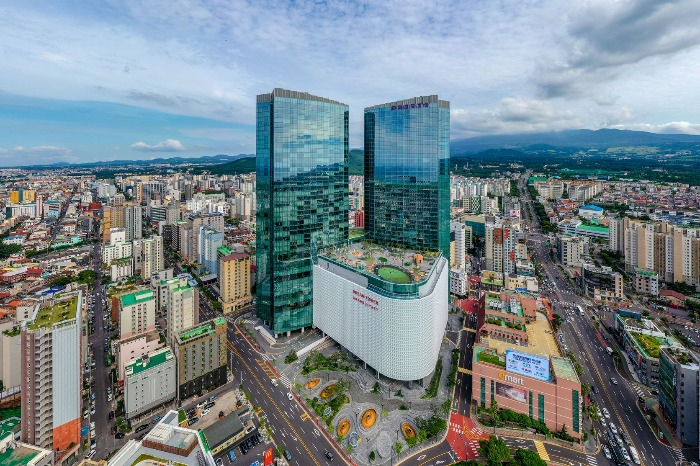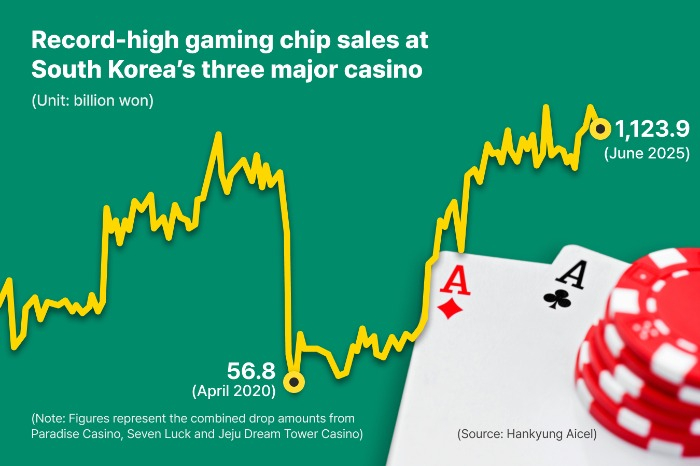
The drop amount, or gaming chip purchases, at South Korea’s major foreigner-only casino venues spiked to a record high of 3.42 trillion won ($2.5 billion) in the second quarter, extending strong momentum amid the global craze for K-content such as K-pop.
They are expected to continue their winning streak in the second half, supported by the anticipated nationwide expansion of the country’s visa-free entry program for Chinese visitors in the third quarter
In the April-June quarter, the drop amount at the casino venues operated by Paradise Co., Grand Korea Leisure Co. (GKL) and Lotte Tour Development Co. jumped 11.9% to 3.42 trillion won from the year prior, according to Hankyung Aicel, the alternative data platform of The Korea Economic Daily.
The tally marked a 13.8% rise, compared to the first quarter.
In the first half of this year, the drop amount at their casino venues reached 6.42 trillion won, surpassing the previous half-year record of 6.09 trillion won set in the year-earlier period.

According to the Korea Tourism Organization, foreign arrivals to South Korea in May reached 1,639,387, up 14.9% from the same month last year, with Chinese visitors accounting for 30% of the total.
In April, the number of foreign arrivals to the country hit an all-time high of 1,707,113.
In the January-May period of this year, the number of foreign visitors rose 14.7% to 7.21 million, up 14.7% from the year before.
JEJU ISLAND
Jeju Island led the surge in foreign tourist arrivals as the country’s largest island grants Chinese visitors to enter visa-free for up to 30 days.
According to the Jeju Tourism Organization, 214,517 foreign nationals entered the island in May.
Chinese visitors represent 76%, or 164,094. That compared to 129,118 in the same month last year, marking a 27% rise.
The next largest group of visitors to the tourist island were from Taiwan (17,901), Singapore (3,327) and Japan (3,258).
Jeju Dream Tower Casino, run by Lotte Tour Development Co., posted a 63% gain on-year in drop amount of 668.5 billion won in the second quarter, marking its highest quarterly performance since opening in 2021.
In June alone, the drop amount at the casino shot up 86% on-year to 241.7 billion won.

“Most visitors to Jeju Dream Tower are Chinese mass-market customers,” Lee Hyun-ji, an analyst at Eugene Investment & Securities Co., said in a research note on Lotte Tour Development.
“Steady growth in Chinese visitor numbers will drive its earnings higher in the second half of the year,” she noted.
Paradise Co., which operates casinos in Jeju, Seoul, Incheon and Busan, also set a new quarterly record with a drop amount of 1.84 trillion won in the April-June quarter, up 8% from the same period last year.
“With the growing number of tourists visiting South Korea, we are seeing an increase in both mass-market players and high rollers at our casino,” said a Paradise official.
The three companies’ eight casino venues accounted for 81% of total admissions to South Korea’s foreigner-only casinos as of the end of 2024.

However, Chinese arrivals have yet to recover the 2016 peak of 8 million.
Following Seoul’s decision to deploy the THAAD missile-defense system and the outbreak of the COVID-19 pandemic, the number of Chinese visitors fell to 4.6 million last year.
Now, South Korea’s tourism industry is betting big on the looming visa waivers, with airlines adding new routes to China.
IN CONTRAST TO MACAO, LAS VEGAS
The country’s casino industry rebound is in stark contrast to Macao and Las Vegas — the traditional meccas of gambling.
Macao’s casino revenue came in at 21.1 billion patacas ($2.6 billion) last month, according to the region’s statistics bureau.
That is 11% below the level recorded in June 2019, just before the pandemic, and roughly half the monthly peak set in 2014, during Macao’s heyday.
Las Vegas is also grappling with flat casino revenue, weighed down by a slowdown in major international events in the city.
By Tae-Ho Lee, Jae-Kwang Ahn and Bum-Jin Jun
theless@hankyung.com
Yeonhee Kim edited this article.















